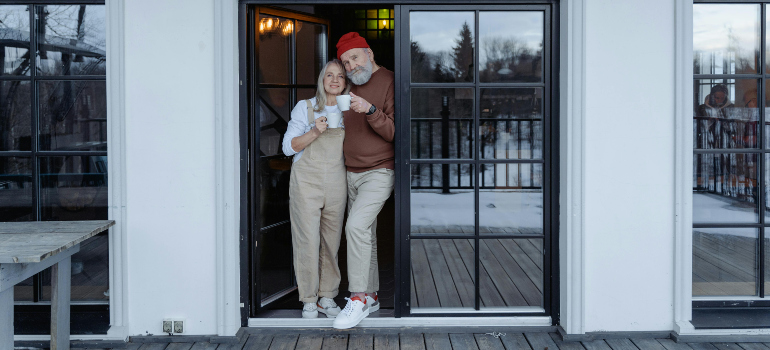10 Signs It’s Time to Help Your Loved One Move to Senior Housing
Get a QuoteSometimes, staying at home may not be the best or safest option for an aging loved one. There are several signs it’s time to help your loved one move to senior housing, where they can receive the support and care they need. In this guide Interstate Moving and Storage highlights key indicators with ways senior housing can enhance your loved one’s quality of life and well-being.
Identifying Safety Hazards in the Home
One of the biggest signs that it’s time to consider senior housing is when safety becomes a daily worry. Maybe your loved one is struggling with stairs, tripping over rugs, or just generally finding it hard to get around safely. If they’ve had more than one fall, it’s often a wake-up call. Senior housing facilities are built with safety in mind—no steep staircases or slippery floors. Instead, these communities minimize risks, offering a safe space for seniors to enjoy life without worry. Specialized movers can help your senior loved one move, handling all the details to make the process as smooth and gentle as possible.

When Health Issues Require Constant Care
If your loved one has chronic health conditions that require regular attention, it may be time for a change. Frequent doctor visits, medication needs, or conditions that require 24/7 support can be hard to manage at home. Senior housing facilities often have on-site medical professionals and trained staff ready to help around the clock. Moving into a community like this ensures your loved one’s health needs are met in a supportive setting, giving you peace of mind.
Struggling to Manage Daily Activities Alone
As we age, daily routines like cooking, cleaning, and personal care can become more difficult and sometimes even unsafe. If you notice that your loved one is skipping meals, neglecting household chores, or struggling with basic hygiene, these are strong indicators that they need more support. Senior housing staff are trained to assist with these activities. This allows residents to enjoy life without worrying about cooking or keeping up with chores. This change can ease the impact of relocation on seniors. It helps them adjust gently to a new environment that supports their well-being.
Feeling Lonely and the Benefits of Senior Housing
Loneliness can creep in when someone lives alone, and it has a big impact on mental health. When a loved one spends most of their days alone or struggles to meet up with friends and family, it might be time to consider a senior community. These housing options offer built-in social networks, daily activities, and chances to meet new people and make friends. Moving to a community setting can fill their days with companionship, activities, and a renewed sense of belonging. Imagine the joy and comfort of knowing they have people around them ready to chat, laugh, and share experiences.
Increasing Forgetfulness and the Need for Supervision
Memory lapses happen to everyone, but certain instances can signal a deeper concern. If your loved one forgets to turn off the stove, take their medication, or frequently misplaces important items, it may be time to consider additional support. Senior housing facilities offer structured environments with supervision, ensuring these needs are safely managed. You don’t have to worry about whether they remembered to lock the door or take their medication. The right care is provided so your loved one can live with safety and dignity. This support eases your worries, too. These communities help create a comfortable new home for your loved one where they can feel secure and well cared for, easing the stress for the whole family.

Signs of Difficulty Maintaining Personal Hygiene
When your loved one stops caring for their personal hygiene, it can be a sign they’re finding it too hard to live independently. If you notice unwashed clothes, strong body odor, or that they’re wearing the same outfits repeatedly, these are red flags. In a senior housing setting, they’ll receive the personal care support they need, and you’ll have peace of mind knowing they’re well taken care of.
Challenges with Home Maintenance and Upkeep
Keeping up with household tasks, from dusting to lawn care, can become overwhelming as we age. If your loved one’s home is beginning to look neglected or if basic repairs are piling up, it might be time for a simpler living arrangement. Senior housing removes the need for chores and home maintenance. With this worry lifted, your loved one can relax in a clean, well-maintained environment without the strain of household upkeep.
Managing Reduced Mobility in Everyday Life
Difficulty moving around, climbing stairs, or even getting out of bed can make day-to-day life challenging and sometimes dangerous. If your loved one’s mobility is declining, senior housing with trained staff can help ensure they have the support they need to stay active and safe. Assisted living communities often have specially designed spaces and programs to encourage physical activity at each resident’s own pace, helping them maintain mobility and independence as long as possible.
Financial Struggles and the Need for Support
Managing finances can become complex and stressful with age. Difficulty paying bills on time, unusual purchases, or trouble tracking expenses may signal the need for a more supportive living situation. Senior housing communities provide stability, allowing residents to live comfortably without worrying about upkeep or utility bills.

Caregiver Exhaustion and the Benefits of Professional Help
Caring for a loved one can be incredibly rewarding, but it can also be exhausting. If you’re feeling stretched thin, emotionally drained, or if caregiving responsibilities are affecting your health, it might be time to consider senior housing as an option. A senior community provides round-the-clock support. This allows you to step back from caregiving and focus on being a supportive family member again.
Starting the Conversation About Senior Housing
Transitioning to senior housing can be challenging to discuss with a loved one. Here are some thoughtful approaches:
- Choose the Right Moment: Find a calm, private time when you both feel relaxed and aren’t rushed. Avoid sensitive moments, like right after a health scare, to keep the conversation gentle.
- Express Empathy and Understanding: Begin by showing empathy, saying something like, “I know how important your home is to you.” This shows respect and helps them feel understood.
- Share Observations, Not Judgments: Mention specific incidents without sounding critical. Try using “I” statements, like, “I noticed you seemed unsteady on the stairs.” This makes it less confrontational.
- Highlight the Benefits for Quality of Life: Frame the idea positively. Focus on the enhanced safety, community, and support they would receive in a senior housing setting.
- Invite Their Input and Involvement: Involve them by asking for their thoughts and concerns. This can make them feel more in control of the process.
- Offer Support: Let them know you’ll be there to support them through every step, no matter what.
Taking the Next Step with Confidence
No one wants to think about moving their loved one out of their home, but the signs it’s time to help your loved one move to senior housing can make the decision a bit clearer. Senior housing offers a safe, engaging environment to enjoy a high quality of life. Trust your instincts, reach out for support, and remember—there are resources to guide you through each step of the process. Experienced senior movers can handle the logistics carefully, ensuring your loved one feels supported. With the right community and moving help, this transition can be a positive step for their safety, health, and happiness in their golden years.
